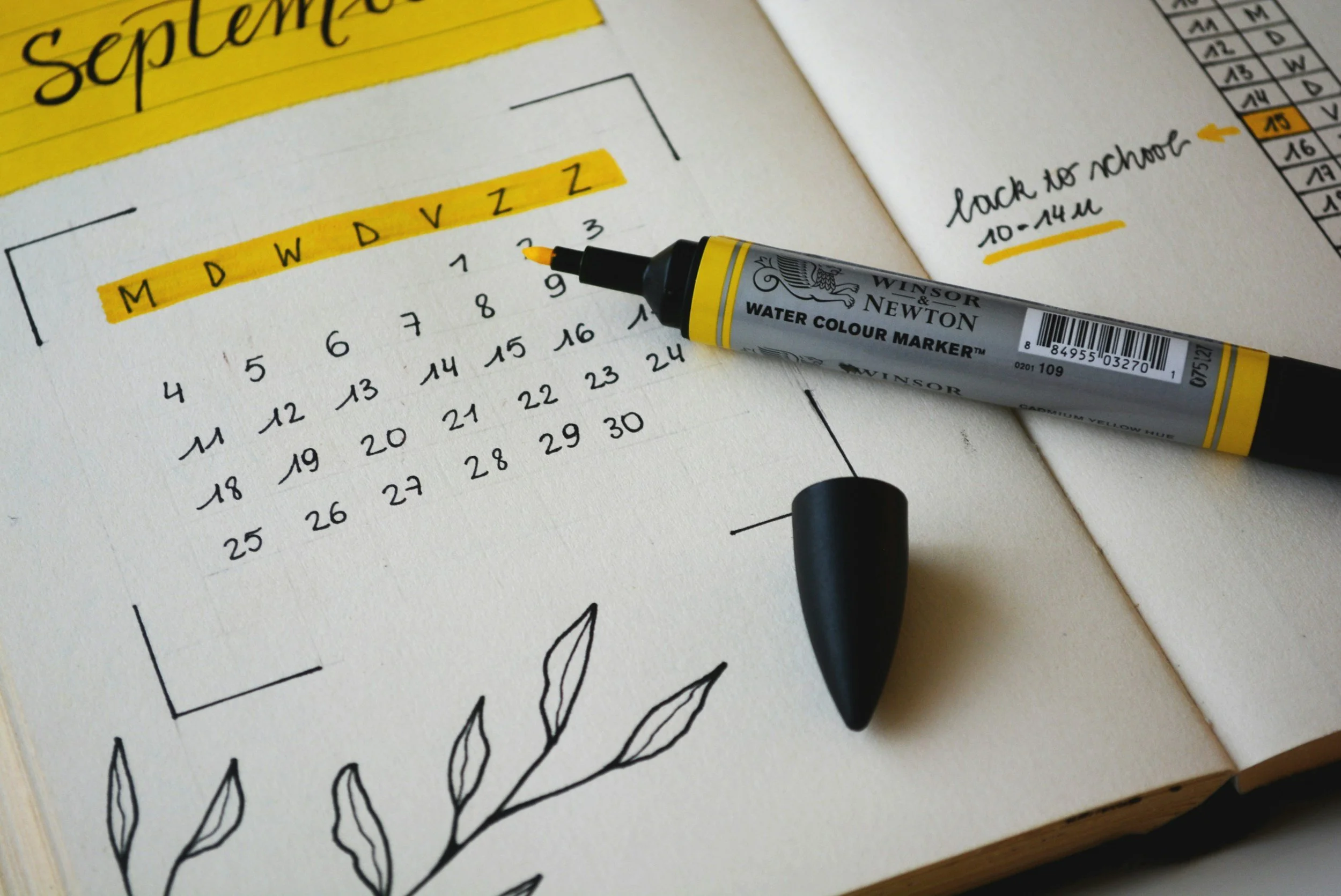How Trauma Shows Up When Routines Reset
When Routine Changes Feel Bigger Than Expected
If you’ve ever noticed that a shift in routine like returning to work after a holiday, kids going back to school, or a schedule change leaves you feeling more anxious, irritable, exhausted, or emotionally shut down, you’re not alone.
For many adult women, routine changes can feel unexpectedly destabilizing. Even when life is objectively “back to normal,” your body may feel anything but calm. You might notice increased worry, difficulty focusing, a short fuse, or a heavy sense of dread that doesn’t seem to match the situation. These reactions can be confusing and frustrating, especially if you pride yourself on being capable, resilient, and high functioning.
What’s important to know is this: these responses aren’t a sign that something is wrong with you. They’re often a reflection of how trauma lives in the nervous system and how that system responds when predictability shifts.
How Trauma Impacts Routine and Predictability
Trauma trains the nervous system to prioritize safety above all else. When someone has experienced trauma, whether from a single event or ongoing stress, emotional neglect, or relational wounds the nervous system learns that the world can be unpredictable or unsafe.
Because of this, predictability becomes a powerful source of regulation. Routines help signal to the nervous system, “I know what’s coming. I can prepare. I am safe enough.” Over time, routines can act like scaffolding that holds things together.
When routine changes occur, even if their good changes, that sense of safety can be disrupted. The nervous system may interpret change as risk, not because the change is dangerous, but because uncertainty has historically been linked to threat.
This is why trauma and routine changes are so closely connected. A reset in structure can activate survival responses, even when your logical mind understands that everything is okay. Your body is responding based on learned patterns, not present-day reality.
Common Trauma Responses When Routines Reset
When routines change, trauma responses can show up in different ways. Some common reactions include:
Increased anxiety or excessive worrying
Irritability
Fatigue, brain fog, or difficulty concentrating
A sense of shutdown, numbness, or withdrawal
Trouble sleeping or changes in appetite
Feeling overwhelmed by tasks that usually feel manageable
These are not signs of weakness. They are nervous system automatic responses designed to protect you.
For some people, the nervous system shifts into fight or flight, leading to restlessness, tension, or heightened anxiety. For others, it leans toward freeze or shutdown, resulting in low energy, disconnecting, or emotional heaviness. Many women cycle between these states, especially during transitions.
Understanding these responses through a trauma-informed lens allows for compassion instead of self-criticism. Your nervous system isn’t broken, it’s responding the way it learned to survive.
Practical Ways to Support Yourself During Transitions
Supporting nervous system regulation during routine changes doesn’t require pushing yourself harder or forcing quick adaptation. In fact, gentleness and flexibility are often far more effective.
Here are some practical ways to support yourself during transitions:
1. Add predictability where you can
If part of your routine has changed, anchor yourself with small, familiar rituals: morning coffee, an evening walk, a consistent bedtime routine. These cues help your nervous system feel grounded.
2. Slow down transitions
Build in buffer time when possible. Rushing from one role or task to another can heighten stress responses. Even a few minutes to pause, breathe, or reset can make a difference.
3. Name what’s happening
Gently acknowledging, “My nervous system is adjusting,” can reduce shame and self-blame. Awareness alone can bring relief.
4. Engage the body
Nervous system regulation often works best through the body rather than the mind. Gentle movement, stretching, deep breathing, or grounding exercises can help signal safety.
5. Practice self-compassion
Instead of asking, “Why is this so hard for me?” try asking, “What do I need right now?” Compassion creates safety, which allows regulation to follow.
Remember, supporting trauma responses isn’t about eliminating discomfort its about increasing your capacity to move through change with more steadiness and care.
How Therapy Can Help During Routine Shifts
Therapy support can be especially helpful when routine changes consistently feel overwhelming or destabilizing. Trauma-informed therapy works with the nervous system, not against it.
Through therapy, you can learn to:
Recognize your unique trauma responses
Build tools for nervous system regulation
Increase emotional flexibility during transitions
Develop a deeper sense of internal safety
Respond to change with less fear and more self-trust
Rather than pushing yourself to “just cope,” therapy offers a space to understand why transitions feel hard and to develop sustainable ways of supporting yourself through them.
Noticing Without Judgment
As you move through routine changes, try gently noticing how your body and emotions respond without judgment or pressure to fix anything. Awareness is often the first step toward healing.
If transitions regularly leave you feeling anxious, depleted, or disconnected, you don’t have to navigate that alone. Therapy support can help your nervous system feel safer, more regulated, and more resilient during life’s inevitable shifts.
You deserve support that honors your experiences and helps you feel more at home in yourself even when routines reset.
Joy Allovio, LPC is a licensed therapist, with over 8 years of experience supporting clients in Waco, Tx. She specializes in anxiety and trauma counseling for adult women and uses evidence-based approaches like EMDR to help clients reduce anxiety and get back to living their life. At Therapy with Joy, she is committed to providing compassionate, expert care both in-person and online for clients across Texas.
How Therapy can help Women Struggling with Anxiety
You Don’t Have to Carry This Alone
If you're a woman feeling overwhelmed by anxiety, perfectionism, or self-doubt, you're not broken. You're exhausted. Therapy can help. I work with adult women who look like they have it all together, but inside they’re struggling to breathe under the weight of worry.
What Can Anxiety Look Like for Young Women?
It’s not always panic attacks. It might be:
Constant overthinking
Fear of disappointing others
Trouble sleeping or relaxing
Racing thoughts during class or work
Feeling like you’re never “enough”
Anxiety often hides behind high achievement and people-pleasing. But it doesn’t have to run your life.
How Therapy can Help
Therapy gives you a space to breathe and tools to begin to feel better.
1.First, we calm the nervous system.
Using mindfulness tools, I’ll help you build emotional regulation skills so you can feel more in control in your body and your mind.
2. Then, we challenge the inner critic.
With CBT, we’ll gently look at those harsh thoughts that say, “You’re not good enough,” and learn how to rewrite them with compassion.
3. Finally, we’ll heal the past.
If your anxiety is rooted in past wounds like a critical parent or toxic relationship, EMDR can help release the emotional charge so you can stop carrying it.
What it’s like to work with me.
My therapy style is warm, nonjudgmental, and collaborative. I’m not here to fix you. I’m here to support you in healing and becoming the best version of you.
I offer in-person sessions in Waco, TX and online therapy for adult women across Texas. I accept Aetna and Cigna insurance and also offer self pay at $130/session.
Let’s take the first step.
If you’re ready to start healing anxiety and reconnecting with yourself, I’d love to support you!
Visit www.therapywithjoy.net to learn more or book a free consult.
Anxiety 101
What is Anxiety?
Anxiety is your body’s natural response to stress. It’s that feeling of worry, fear, or nervousness that kicks in when you’re facing something uncertain or challenging. If you’re in a tough situation like speaking in front of a crowd or preparing for an exam, a little bit of anxiety can actually help you stay focused and motivated.
However, worry becomes a problem when it sticks around too long or happens too often. When it’s constant, intense, or hard to deal with, it can affect your daily life. Suddenly, things like school, work, or spending time with friends can feel overwhelming. You might avoid situations that make you anxious, procrastinate on school assignments, or struggle to sleep because you can’t stop all the thoughts.
The tricky thing about anxiety is that it doesn’t always make sense to those around you. You might feel worried and not know why. Your heart might pound even when you know you're not in real danger. This disconnect between what you feel and what you know can make anxiety frustrating and exhausting.
Think of anxiety as your brain’s built-in emergency alert system. Imagine you’re one of our ancient ancestors, and a predator suddenly appears. Your brain yells, “DANGER! DO SOMETHING!” Your heart races, your breathing speeds up, and your muscles prepare to fight, flee, or freeze. That alarm system kept people alive. Today’s “predators” might be exams, job interviews, awkward social situations, or big life decisions. Even though there isn’t any physical danger, your brain still hits that panic button, and you experience the same physical symptoms: a racing heart, tense muscles, and uneasy feelings.
Why Anxiety Feels So Intense for Teens and Young Adults
If you’re a teen or young adult dealing with anxiety, here’s why it feels so intense. Your brain is still under construction. The emotional part of your brain (the amygdala) develops faster than the part that helps you manage emotions and make rational decisions (the prefrontal cortex). This means big feelings like anxiety can make you feel overwhelmed and out of control.
When you add in school stress, friendship drama, dating confusion, family expectations, and the whole “What am I doing with my life?” question it becomes the perfect storm for anxiety.
How Anxiety Shows Up
Anxiety doesn’t look the same for everyone, but here are some common symptoms:
Physical: Racing heart, stomach in knots, headaches, muscle tension, shakiness
Emotional: Constant worry, irritability, feeling on edge, a sense of dread
Behavioral: Avoiding situations, procrastinating, needing constant reassurance, trouble sleeping
For parents: If your teen is withdrawn, irritable, or struggling with responsibilities, anxiety could be the cause.
There is Hope
Anxiety can feel overwhelming, but it doesn’t have to control your life. Understanding why it happens is the first step toward managing it. It’s not a sign of weakness. It’s your brain trying to protect you it just goes a little bit overboard sometimes. By understanding how anxiety works and why it happens, you can take the first step toward managing it and finding ways to feel more in control. Whether you’re battling anxiety yourself or supporting someone through it, know you’re not alone. There’s hope and there’s help.
Watch for upcoming posts on coping, resilience, and seeking support.



